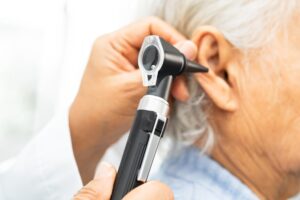Happy American Heart Month from Colorado Ear Care!
Each year in February, the American Heart Association launches a campaign to educate the population about heart health and just how important it can be to our overall well-being. After all, heart disease is the #1 cause of death in the U.S.
Heart disease — among other cardiovascular conditions — is also one of the most common comorbidities in the American population, which essentially means that heart disease sometimes happens in parallel with any number of other health conditions, like diabetes, vision problems, and even hearing loss.
While there is still research to be done on the connection between our hearts and our hearing, some studies have found that those with heart conditions may be at a higher risk for hearing loss, and there is a solid theory as to why.
How are cardiovascular problems related to hearing?
Before we dive into the connection between our hearts and our hearing, it’s important to understand what causes heart disease in the first place.
“Heart disease” can refer to a few different types of heart conditions, but coronary artery disease (CAD) is the most common among Americans. CAD is diagnosed when blood flow to the heart is restricted, and it can lead to heart palpitations (or an arrhythmia, in technical terms) on the milder side or a full-blown heart attack on the extreme side.
There are several different risk factors for heart disease, and a 2023 report found that almost half of Americans have at least one risk factor, making them more likely to develop heart disease in their lifetime. Things like diabetes, obesity, an unhealthy diet, a sedentary lifestyle, and drinking excessive amounts of alcohol are the most common risk factors, but heart disease can also be hereditary, so you may also develop heart disease if it runs in your family.
Knowing that heart disease is caused by a restriction of blood flow to the heart, it makes sense why hearing loss is a common comorbidity of cardiovascular conditions.
Though small and invisible to the average person, our inner ears are made up of very complex structures that work in tandem to turn external sounds into electrical signals that can be read by the brain. Perhaps the most important of those structures is the cochlea, which is a spiral-shaped organ filled with fluid and is the primary place where sound is translated for our brains.
And, when the cochlea doesn’t have enough blood flow bringing oxygen to it, it can’t work as effectively and can even suffer long-term damage. That’s where heart health and our hearing are connected — our hearts are responsible for pumping blood to the rest of our body, and when that blood flow is restricted, it can lead to cell death within the cochlea and, ultimately, hearing loss.
Tips for supporting your hearing through your heart health
Heart disease is unfortunately very common in the U.S., and that is probably at least a small part of the reason why hearing loss is on the rise, as well. So, is there anything you can do to lessen your risk of developing heart disease and, therefore, hearing loss? Yes!
Here are a few tips for heart health that can also have a positive impact on your hearing:
1. Eat a healthy diet with hearing-healthy nutrients
The average American diet is full of cholesterol, sugar, and unhealthy fats that can make it harder for the heart to function. So, make sure you’re cutting back on foods that are high in cholesterol and sugar and replace them with fruits, vegetables, and lean protein.
And, for an added boost to your hearing health, look for foods that are high in magnesium and omega-3 fatty acids, like salmon, flax seeds, and spinach.
2. Stay active — whether that be a walk or your favorite workout
Almost every function in our body requires repetition to perform at an optimal level, and our hearts pumping blood is no different. Exercise is one of the best ways to get the heart pumping, so whether you’re taking gentle walks or going hard at the gym, moving your body can be great for heart health.
What’s more, consistent exercise can also decrease fall risk in older adults — something your inner ears are deeply involved in.
3. Attend your regular doctor’s appointments (including your Audiologist!)
Heart disease is often considered the “silent killer,” because it can go undetected until something like a heart attack happens. So, if you have one of the risk factors we mentioned or if heart disease runs in your family, make sure you’re seeing your primary care provider or a cardiovascular specialist regularly to keep tabs on your heart.
And, make sure you’re doing the same with your hearing care provider, too! Hearing loss develops slowly, and annual hearing tests are the best way to catch hearing loss sooner than later.
–
While having a cardiovascular condition does not automatically mean you’ll develop hearing loss, it does put you at a higher risk, so if you have a heart condition — or if heart conditions run in your family — it’s important to see an Audiologist to catch hearing loss early.
If you’re in the Denver area, we’d love to help you take control of your hearing health, and that all starts with a hearing test. Schedule an appointment today!




